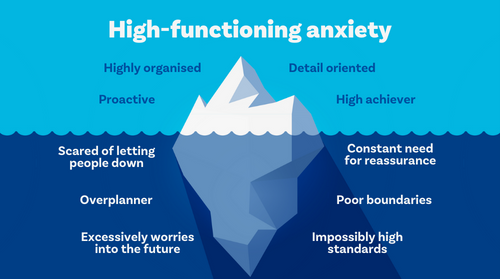High-Functioning Anxiety: The Undercurrent of Success
When we picture anxiety disorders, we often imagine someone visibly overwhelmed, paralyzed by fear, or struggling to complete daily tasks. Yet, there’s a significant segment of the population experiencing anxiety who appear to defy this stereotype. These individuals, often referred to as having high-functioning anxiety, navigate life with a persistent undercurrent of worry and anxiety, all while maintaining a facade of achievement and composure.
When we think of anxiety disorders, we tend to think of someone who feels nervous, worries excessively and is restless.
But what if on the outside that person comes across as confident, outgoing and organized? They don’t have any anxiety, right?
That’s not necessarily the case. They might have high-functioning anxiety, an undiagnosable anxiety condition.
The term high functioning anxiety describes an individual who, despite feeling anxious, seems able to effectively manage the demands of day-to-day life.
Those with high-functioning anxiety may demonstrate the following traits:
- High achiever.
- Highly organized.
- Detail oriented.
- Proactive.
An individual with high-functioning anxiety may appear calm on the outside but feel very anxious internally. They may show the signs and symptoms of anxiety paired with unique behaviors such as:
- Controlling their behavior with strict routines and habits
- Seeming busy all the time with a to-do list that never ends
- Striving for perfection in every area of life
- Often being hard to read and relate to.
Sound like you or someone you know?

Understanding High-Functioning Anxiety
High-functioning anxiety isn’t a clinical diagnosis in the Diagnostic and Statistical Manual of Mental Disorders (DSM-5). However, it describes a prevalent experience for many high achievers. People with this condition exhibit the classic symptoms of anxiety – excessive worry, negative thought patterns, and physical tension – but they’ve developed effective coping mechanisms that allow them to function at a high level.
This ability to function effectively can be a double-edged sword. On the one hand, it allows individuals to excel in academics, careers, and social situations. They may appear confident, organized, and driven, often exceeding expectations. However, beneath the surface lies a constant internal battle – a relentless stream of anxieties that can be exhausting and isolating.
Signs and Symptoms: The Hidden Struggle
While the outward presentation of high-functioning anxiety can be deceptive, there are subtle signs that may reveal the internal struggle. Here are some common characteristics:
- Perfectionism: People with high-functioning anxiety may set impossibly high standards for themselves. They meticulously plan, double-check everything, and have a strong aversion to mistakes. This perfectionism can fuel their accomplishments but also lead to significant self-criticism and disappointment.
- Overthinking: They may ruminate on past events, constantly analyzing conversations, and dwelling on potential future failures. This overthinking can paralyze decision-making and lead to missed opportunities.
- Control Issues: The need to feel in control is a common theme. They may meticulously plan schedules, micromanage tasks, and avoid situations that feel unpredictable. This desire for control can create rigidity and strain relationships.
- Procrastination: Despite their drive for achievement, high-functioning anxiety can lead to procrastination. The fear of failure or not meeting their high standards can lead to putting things off until the last minute.
- Physical Symptoms: The constant undercurrent of anxiety can manifest physically as headaches, muscle tension, fatigue, or digestive issues. If there’s no other clear medical cause, these could be due to anxiety, but check with a medical professional if you’re concerned.
- Social Anxiety: Despite appearing outgoing, social situations can be nerve-wracking for those with high-functioning anxiety. They might worry about being judged or not being interesting enough, leading to social awkwardness or avoidance.
- Imposter Syndrome: Many individuals with high-functioning anxiety struggle with feelings of being a fraud. They may doubt their accomplishments and fear being exposed as not good enough.
The High Achiever Paradox: Benefits and Challenges
High-functioning anxiety can have some positive effects. It can fuel ambition, drive meticulous planning, and lead to a strong work ethic. Individuals with this condition may be highly organized, detail-oriented, and excel in careers that require precision and focus.
However, the long-term consequences of unmanaged high-functioning anxiety can be significant. It can lead to chronic stress, burnout, and difficulty maintaining healthy relationships. The constant pressure to maintain a perfect image can be isolating and emotionally draining.
Breaking the Cycle: Seeking Help and Management Strategies
If you suspect you might have high-functioning anxiety, there’s no shame in seeking help. Here are some steps you can take:
- Talk to a therapist: A therapist can help you identify negative thought patterns and develop healthier coping mechanisms for managing anxiety.
- Cognitive-behavioral therapy (CBT): This form of therapy can be particularly helpful as it teaches individuals to challenge negative thought patterns that contribute to anxiety and develop relaxation techniques.
- Mindfulness practices: Mindfulness meditation and other techniques can help cultivate awareness of the present moment and reduce anxiety symptoms.
- Prioritizing self-care: Engaging in regular exercise, getting enough sleep, and practicing relaxation techniques such as deep breathing or progressive muscle relaxation can significantly reduce anxiety.
- Setting realistic goals: Instead of striving for perfection, set achievable goals and celebrate small wins.
- Learning to say no: Saying no to additional commitments when you’re feeling overwhelmed is crucial. Assertiveness training can help you set boundaries and prioritize your well-being.
- Building a support system: Surround yourself with supportive friends and family who understand your struggles.
Taking Charge of Your Well-Being
High-functioning anxiety may not always present itself as a debilitating condition, but it’s a real struggle that shouldn’t be ignored. By recognizing the signs, seeking professional help, and implementing healthy management strategies, you can learn to navigate the challenges of anxiety and live a fulfilling life.
Begin Treatment for High-Functioning Anxiety in Arkansas
At Brookway Counseling, we understand the impact that high-functioning anxiety can have on daily life. Our compassionate and experienced mental health professionals are here to help. If you or a loved one is struggling with high-functioning anxiety, we encourage you to reach out to us to schedule a consultation. Together, we can develop a personalized treatment plan. This can help you manage your anxiety and achieve optimal mental health and wellness.





